Director – Lionel Jeffries –1970 – UK – Cert. U – 109m
****1/2
After their father is arrested and the family plunged into poverty, three siblings and their mother leave London for the Yorkshire countryside – now on BBC iPlayer until around mid-August, also recently back out in cinemas for one day only on Sunday, July 3rd
E. Nesbit’s book The Railway Children, set in 1905, has been filmed several times, most notably as the BBC TV series of 1968 and Lionel Jeffries’ 1970 cinema film, both of which starred Jenny Agutter as the eldest of three children sent from the city to Oakworth in Yorkshire. What is arguably the 1968 and 1970 version’s most memorable sequence has the children stand on train tracks waving red flags to stop an oncoming train and prevent an accident after a tree falls on the line ahead.
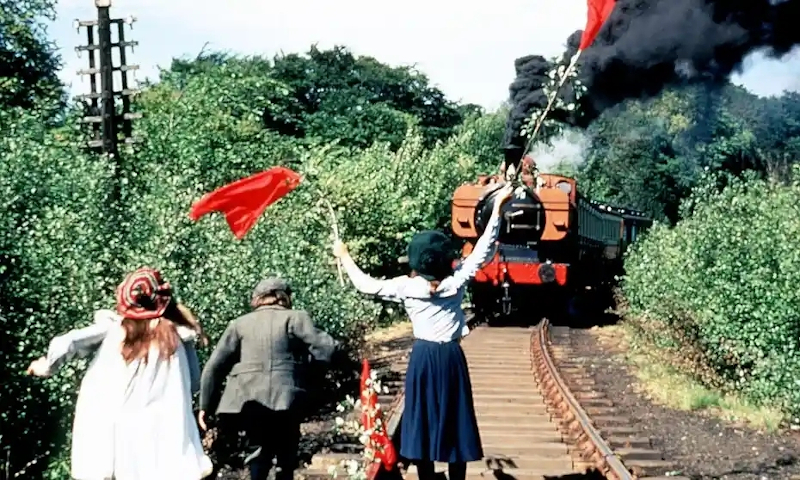
My parents used to sit me and my younger brother down and make us watch Sunday teatime BBC classic serials, something which has engendered a deep seated dislike within me for both filmed costume drama and literature considered worthy enough to film. I found the former stodgy and suspect the latter may be more to do with BBC cultural filters than anything else. But I digress: those are sentiments to be explored further another time. Suffice to say that I’m sure I saw the TV series on first transmission and probably many subsequent reruns, and must have been taken to see the film in cinemas at least once. Also, my dad loved trains and trains featured heavily. So The Railway Children is lodged deep in my subconscious as a muddle of the two versions with Jenny Agutter in the same role.
So with a brand-new sequel The Railway Children Return (Morgan Matthews, 2022) coming out mid-July, and the original 1970 film getting a brief theatrical outing in a gorgeous, pristine digital print before then, I was curious to see how the original film would play today and how the sequel compared with it. I attended a press screening having not seen the film for decades, and having recently watched the new sequel. (That’s just the way it worked out with the distributor’s screening schedules: I recommend seeing the original first, which is likely to enhance your enjoyment of the sequel.)
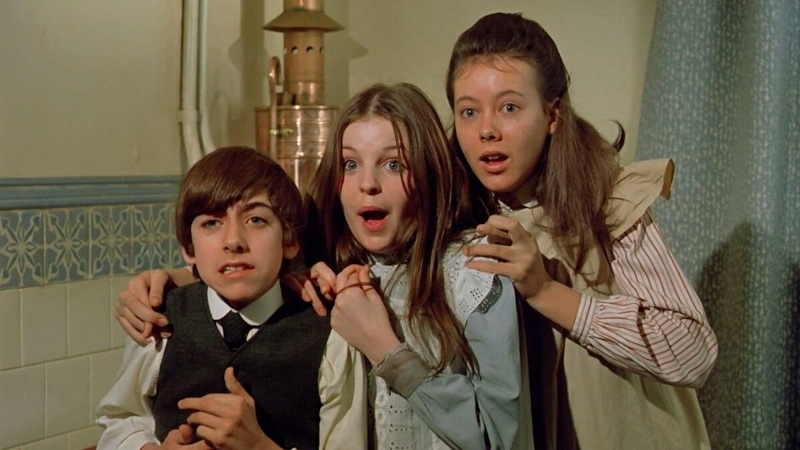
Bobbie, 15, (Jenny Agutter), Phyllis, 12 (Sally Thomsett) and Peter, 10 (Gary Warren) live a contented, suburban London existence in a happy family until the night two policemen call at the door and take their father (Iain Cuthbertson) away. Without the pay coming in from his government job, they are thrown into poverty and travel by train to the small country town of Oakworth in Yorkshire where they settle in a house called the Three Chimneys.
There they get into the habit of sitting on a fence across the fields to watch the trains go past every morning. They wave at the train and a friendly, well-to-do-looking old gentleman (Wiliam Mervyn) waves back. During their stay in Oakworth, the train will give rise to a series of adventures. It will bring a Russian immigrant, a writer fleeing the Tsar, who is searching for his wife and family who have settled somewhere in England. In a train tunnel, they will find a runner from a local race whose leg is injured and see that he is taken to safety. And one day, they will see a tree collapse onto the track and have to find a way to stop an oncoming train to prevent a serious accident.
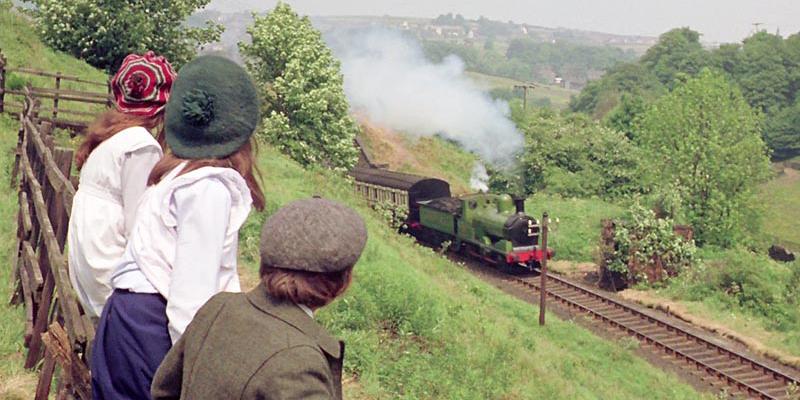
While all this is going on, their mother (Dinah Sheridan) must carry on as if everything were perfectly fine. But it isn’t: her husband has been accused of and imprisoned for passing on state secrets to a foreign power, a fact she conceals from the children until Bobbie chances to read it in an old newspaper.
There are unexpected references to Catholicism, to which Nesbit had converted from the Church of England. Shortly after the family’s arrival in Yorkshire, Bobbie discovers Peter is replenishing the house’s coal supply by stealing lumps from the pile down at the station. Although the family is poor, Bobbie is horrified, protesting, “don’t you know your catechism” and forcing Peter to return what he has stolen and tell the truth. Times change: I’m not sure I can imagine such an appeal to Christian (Catholic) moral values being made in a film today: indeed, any such religious subject matter is noticeably absent from the upcoming sequel, a contemporary production set four decades later in WW2.
After this incident, the stationmaster Mr. Perks (Bernard Cribbins with a generic Northern accent rather than a genuine Yorkshire one) features in a number of the children’s adventures.
A fascinating piece of trivia:: on the shoot, Thomsett, 20 was three years older than Agutter, 17, but playing her younger sister and contractually required not to visibly smoke or drink on the set.
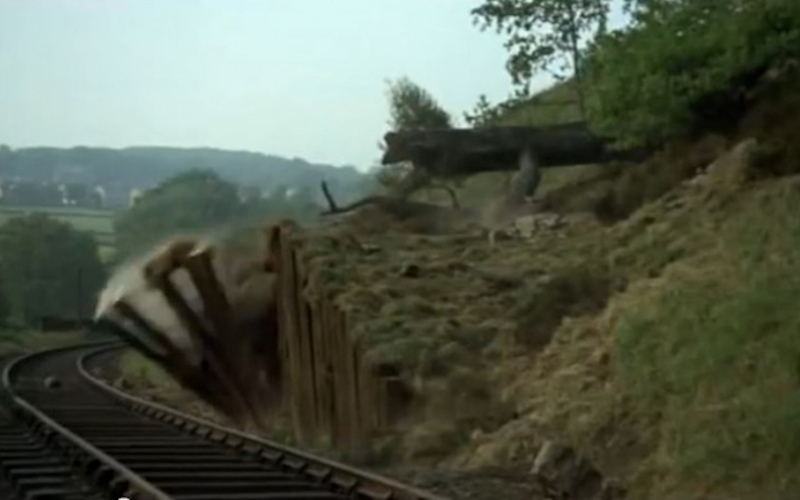
The iconic train crash prevention scene contains an extraordinary special effect whereby trees seem to slide down an embankment whilst remaining completely vertical and upright until they reach the shored up bottom of the slope, causing the corrugated metal shoring and lots of earth with it to fall onto the track. The actual fall is convincing enough, but the tree sliding down the slope beforehand looks strange and unreal, an obvious mechanical effect.
Nevertheless, the storytelling, the three children and the trains are the thing. I was surprised how well it all holds up, even today. Although the new sequel impresses, it isn’t quite as good as this original, a film which has held up remarkably well over the intervening years. Both were shot on and with the help of the Keighley and Worth Valley Railway, in Yorkshire. If you’re planning to see the sequel when it comes out, do yourself a favour and watch this again first. You’ll enjoy the new film all the more.
The Railway Children is now on BBC iPlayer until around mid-August and was recently back out in cinemas in the UK for one day only on Sunday, July 3rd.
The Railway Children Return is out in cinemas in the UK on Friday, July 15th.
Trailer (Reissue):
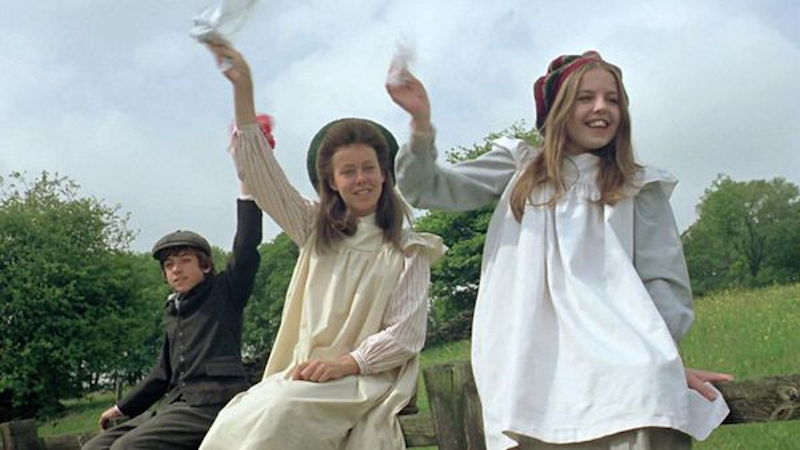
One reply on “The Railway Children
(1970)”
Hi. Re Catholicism, Perks has a picture of the Sacred Heart above his bed. It was searching for this reference that brought me here.
Thanks.